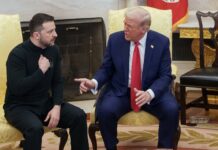Following various coups that have taken place across the Sahel, the coup leaders have often been greeted with praise. In West African countries such as Burkina Faso and Niger, their coup leaders had been praised by large swaths of people (mostly men) waving their national flags as well as Russian flags.
In Gabon, the general who had led the coups had been celebrating in the streets with Gabonese civilians. He had even been tossed up and down by members of the crowd that had come out to celebrate the overthrow of the Bongo administration.
Likewise, it has become typical to see Africans praising the military juntas that have taken power in many of these countries. They praise them for differing reasons, some praise them for what they see as the actions of the military juntas aimed at opposing French imperialism. Others show support because of their frustrations with the former government, which had been overthrown.
This act of celebration, exhibited by members of the public following coups, typically has to do with their frustrations with the status quo. In many of these countries that have experienced coups, the countries face major challenges such as rampant corruption by government officials and insecurity caused by insurgents.
Knowing this context is essential to understanding why such an outbreak of joy has frequently occurred following coups. The members of the public celebrating the overthrow of the government are hoping to see their country turn a new leaf. They are hopeful that the new ruling power would be able to address many of the challenges faced by them.
However, while there may be a sizable number of people who have celebrated the coups that have taken place, these actions have largely been met with grave concern by neighbouring countries and the international community.
Frustrations with government inefficiency
While in some cases, the overthrow of a repressive or illegitimate government may be justified, military overthrows of governments really shouldn’t be celebrated as something positive.
Rather, these coups should be seen as the grave consequences of failed government policies. They are a sign of the consequences of the rampant corruption and economic mismanagement of many Western African governments. Furthermore, they symbolise the widespread perception of government illegitimacy among the populace.
The military coups that have taken place have been a result of these issues finally coming to a head. The reaction of support towards these coups exemplifies the frustration that so many have with their governments.
This frustration is felt in many African countries, which suffer from the same problems of corruption and ineffective governance. If a coup were to take place within Nigeria today, for example, it’s very likely similar scenes would occur of large swaths of the populace coming out to celebrate. Such is the frustration and discontent held by many within the country towards the government here.
Coups really should not be celebrated
While much of the frustration felt by many with the status in our countries is justified, that doesn’t mean a military regime would be a better alternative. In fact, more likely than not, they will be much, much worse.
The reason why a culture of corruption has swept through so many African governments is due to a lack of transparency and accountability. Many civilian government officials have managed to engage in corruption with impunity due to the lack of mechanisms to hold them accountable for their actions. This fact is even more pronounced in military regimes.
Military juntas that rule over nations are even more unaccountable to the people than our current governments. As a result, things like the syphoning off of government resources, and human rights abuses by members of the military can take place without any real consequences. An example being the billions of dollars that had been stolen during the administration of Sani Abacha in Nigeria, after he had taken power following the military coup that put him in control.
Likewise, such accusations of abuses have been waged against many of the militaries that are in power now in Africa. One of the most glaring allegations of abuse comes from Burkina Faso, after the military had been accused of slaughtering hundreds of civilians (including children) that had been accused of supporting insurgent groups by Human Rights Watch. The Burkinabé military did deny the allegation and claimed they were investigating the incident.

The military is not the solution
The answer to these problems faced by African countries is greater adherence to democratic principles and values. The transparency and accountability mechanisms built into democratic institutions are essential in forming effective governing bodies.
What we need are governing systems that are more accountable to our citizens, rather than military regimes that are accountable to no one.
These military takeovers do not represent a new era for the Africa continent, if anything they represent a continuation of the instability and self-interest nature of many of our governments.
The new era for Africa, that will propel the continent towards greater prosperity, would have to be on the basis of greater democratic reforms, with greater government transparency and greater political accountability. Till then, we should just look at these coups as they are, opportunistic figures taking advantage of the ineffective African governments to gain power and control.











